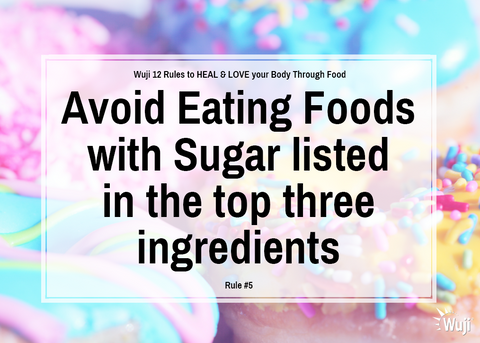
You may have heard people in your life say that they are “gluten intolerant” or dairy or soy intolerant. Many people avoid these foods due to inflammation or the health problems they cause, while others feel fine eating them. There is one food however, that is universally inflammatory, sugar. Dr. Heidi Tumer, a medical nutrition therapist who specializes in anti-inflammatory diets to reduce pain and symptoms related to autoimmune conditions and inflammatory arthritis, says that “everyone is sugar intolerant.”
There are some stipulations to that though. For example, if you eat an apple with naturally occurring sugar, you’re not only consuming sugar, but also vitamins, minerals, fiber and phytonutrients—all things that feed our healthy gut bacteria to help our bodies metabolize the sugar that is found in the apple. The problem with processed foods with added sugar is that we don’t typically get the added nutrients in those foods and we’re typically eating sugar in its pure form—something that we’re not evolved to do.
Dr. Tumer says that the average American typically consumes 94 grams of added sugar per day, which is more than 3 times the daily recommendation for women and almost 8 times more than the daily recommendation for children.
So what is all this added sugar doing to our bodies? A major 2014 study found that eating more than the recommendation of sugar per day can increase your risk of dying from heart disease, even if you go to the gym and eat your greens, it doesn’t compensate for the effects sugar has on your health. Diets high in sugar increase inflammation in your body and may cause insulin resistance, both of which increase cancer risk. A study in over 430,000 people found that added sugar consumption was positively associated with an increased risk of esophageal cancer, pleural cancer and cancer of the small intestine. Another study showed that women who consumed cookies and sweet buns more than three times per week were 1.42 times more likely to develop endometrial cancer than women who consumed these foods less than 0.5 times per week.
Often people go to sugar as a “pick-me-up” but what’s been found is that men who ate a high sugar diet were more likely to develop depression or anxiety than those who ate a low sugar diet. Researchers believe that blood sugar swings, inflammation and neurotransmitter dysregulation may all be reasons for sugar’s damaging impact on mental health.
Hershey recently released research on which state consumed the most candy and found that Utah residents buy candy at nearly double the national average, the state also has some of the highest rates of depression in the country. Suicide is the leading cause of death in Utah for youth between the ages of 10-17, their suicide rate is more than 60 percent above the national average. Foods high in added sugar quickly spike blood sugar and insulin levels, leading to increased energy. However, this rise in energy levels is fleeting. Products that are loaded with sugar but lacking in protein, fiber or fat lead to a brief energy boost that’s quickly followed by a sharp drop in blood sugar, often referred to as a crash.
Unfortunately, giving up sugar isn’t easy as it is often lurking in food we would least expect it in, from salad dressings to our coffee drinks to sauces and whole grain bread. By 2020, the FDA has required companies to label their nutrition facts to specially show if they’ve added sugar or if the sugar is naturally occurring.
Although consuming small amounts now and then is perfectly healthy, you should try to cut back on sugar whenever possible. Fortunately, simply focusing on eating whole, unprocessed foods automatically decreases the amount of sugar in your diet.
Here are some tips on how to reduce added sugar in your diet:
- Swap sodas, energy drinks, juices and sweetened teas for water or unsweetened seltzer.
- Drink your coffee black with coconut oil to add flavor, boost your immune system, speed up your metabolism and increase your energy.
- Sweeten plain greek yogurt with fresh or frozen berries instead of buying flavored, sugar-loaded yogurt.
- Consume whole fruits instead of sugar-sweetened fruit smoothies.
- Replace candy with a homemade trail mix of fruit, nuts and a few dark chocolate chips.
- Use olive oil and vinegar in place of sweet salad dressings like honey mustard.
- Look for cereals, granolas and granola bars with under 4 grams of sugar per serving.
- Swap your morning cereal for a bowl of rolled oats topped with nut butter and fresh berries, or an omelet made with fresh greens.
- Shop the perimeter of the grocery store, focusing on fresh, whole ingredients.
In addition, keeping a food diary is an excellent way of becoming more aware of the main sources of sugar in your diet. The best way to limit your added sugar intake is to prepare your own healthy meals at home and avoid buying foods and drinks that are high in added sugar.
